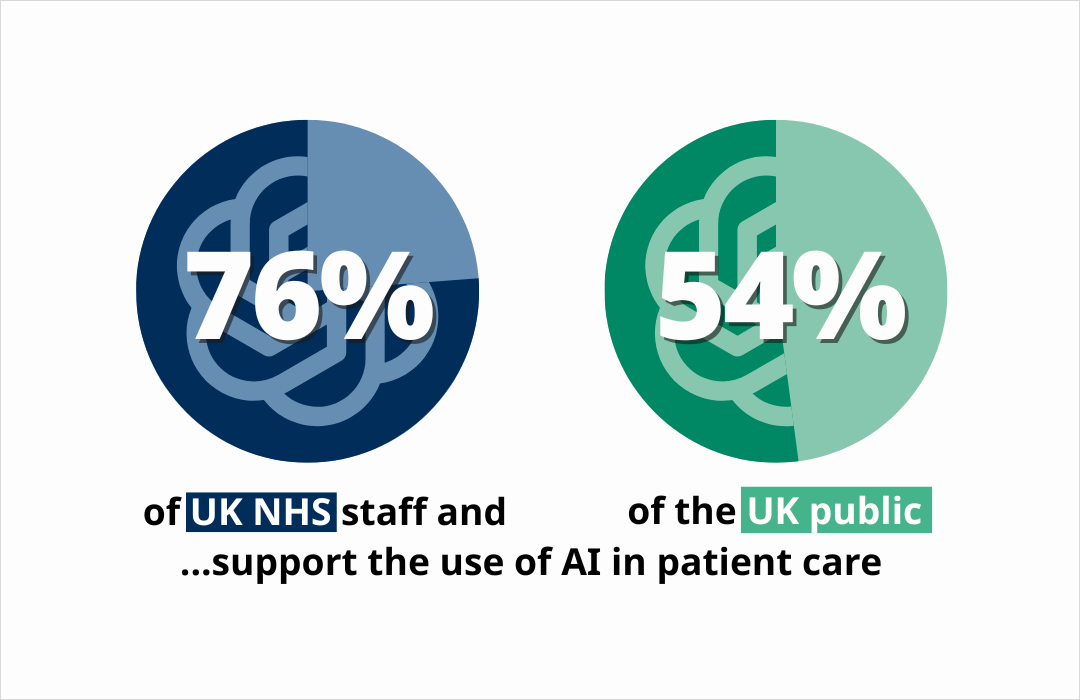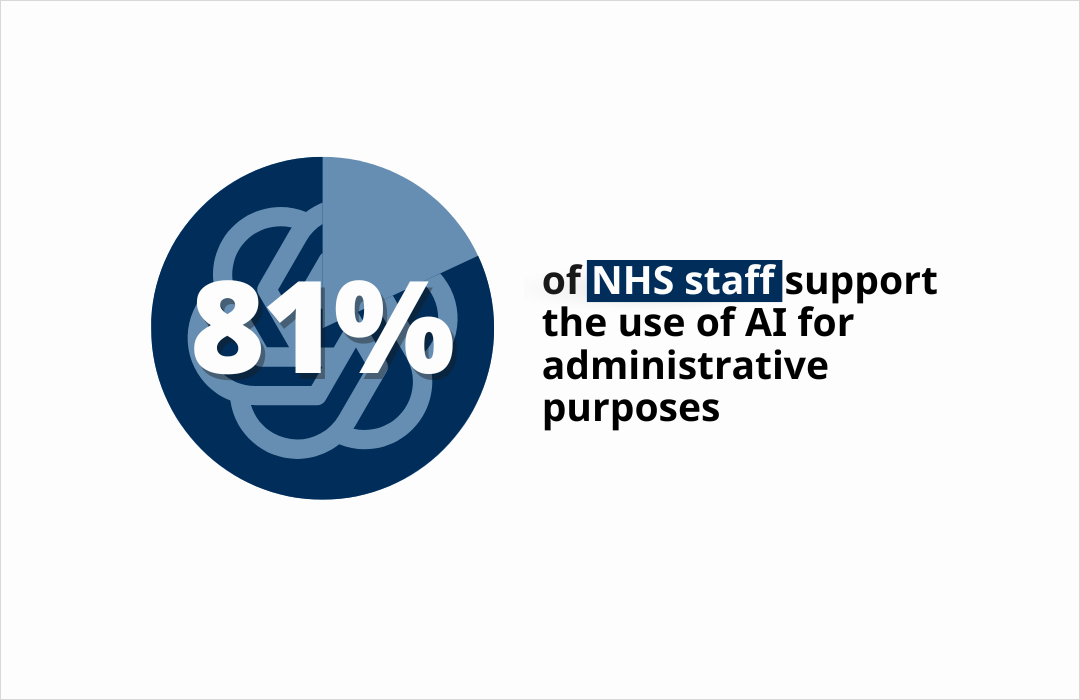AI is rapidly transforming healthcare and providing clinicians with new opportunities for the diagnosis, treatment, and care of patients with ADHD. Virtual and hybrid ADHD clinics are particularly well-placed to capitalize on the opportunities from AI, because they already operate a technology-forward model.
How do the UK public and NHS staff feel about the use of AI in health care?
Nearly 3,500 clinicians and NHS staff members were surveyed recently about their attitudes towards the use of AI in healthcare. Findings concluded that:
- 36% of US clinicians and 34% of UK clinicians reported having used AI at work
- 76% of UK NHS staff and 54% of the UK public support the use of AI in patient care
- 30% of surveyed clinicians felt they had received enough training in AI technologies
- 41% of surveyed clinicians think that those using AI tools will deliver higher quality care in 2-3 years compared to those not using AI
- Clinicians are most optimistic about the potential of AI to save time, speed up diagnosis, and improve patient outcomes
Sources -
Elsevier: Clinician of the Future 2025; The Health Foundation: AI in health care: what do the public and NHS staff think?
How are clinicians using AI in ADHD diagnosis, treatment, and management?
AI technology has the potential to revolutionize clinical workflows, especially in virtual and hybrid ADHD clinics. Using AI technologies to improve appointment scheduling, assist in data analysis for diagnosis, and provide patients with interactive psychoeducation resources can support clinicians to deliver the gold standard of ADHD diagnosis and treatment with increased efficiencies and cost-effectiveness.
Using AI during ADHD treatment and management
Another study explored how AI tools can support clinicians in making ADHD treatment decisions. AI can analyze data from clinical guidelines (e.g., AAP, NICE), patient information, and both clinician and patient preferences on treatment options. It can then recommend a treatment plan tailored to patient and clinician preferences, while staying aligned with guideline recommendations.
Using AI to deliver ADHD psychoeducation
Psychoeducation can play a critical role in helping patients to better understand ADHD and how to manage their symptoms. However, the self-study nature of psychoeducation may not suit all patients.
Aided by AI, clinicians can provide patients with information about ADHD in a more interactive and accessible format, such as via chatbot, online learning modules, or smartphone apps. The strength of AI in this setting is that it can tailor content to a patient’s learning preferences and level of understanding, interact back and forth, and adapt to patient feedback.
We’ve developed an ADHD psychoeducation toolkit that you can share with your patients.
How AI can improve clinic efficiency and administration
Is AI safe to use in ADHD treatment? Beyond a potential role in the virtual clinic care model, AI can also be used to support clinicians in running their clinics more efficiently.
There is scope for AI to lead to efficiencies in:
- Appointment scheduling - Intelligent scheduling can reduce no-shows and allow clinics to run more optimally, improving productivity and revenue
- Automating admin processes – E.g., billing and claims, data processing, documentation management, automated reminders, and compliance monitoring
- Reporting and quality assurance – Data analysis and presentation of operational and patient-support metrics during audits
Building a scalable virtual or hybrid ADHD clinic model with AI
While these benefits can apply in all clinics, there are distinct opportunities in hybrid and virtual clinics. In digital settings, AI could support the seamless coordination of in-person and online or telehealth appointments, automate processes (e.g. sharing rating scale data with team members for review), and tailor patient communications, psychoeducation, and treatment plans to the individual.
These efficiencies form a strong foundation for a scalable model of virtual ADHD care that clinicians can roll out across a wider geography – delivering a consistent, technology-driven model of ADHD care across virtual and hybrid locations.
Digital innovations in ADHD testing and treatment
Obtaining reliable data on ADHD symptoms is a common challenge in diagnosis. Patient rating scales are often not returned, are only partially completed, and can be subject to bias. The incorporation of digital technologies into ADHD workflows can help to address this issue.
Software applications that support ADHD testing
Studies are being conducted on the utility of ADHD tests administered via handheld devices. For example, when smartphone applications for ADHD testing are added as an additional tool, it can help streamline workflows. Mobile-based technology can provide a useful subset framework in clinical settings. It’s cost-effective, increases clinician confidence, and improves accessibility.
The role of AI and wearable devices in ADHD diagnosis
There is scope for data collection beyond clinical appointments. This includes, between appointments, the use of wearable technologies such as smartwatches and fitness monitors. This can be particularly valuable in virtual clinic settings, where appointments may happen via telehealth, and some visual clues, such as body language, may be harder to observe.
Disclaimer – Wearable technology devices like smartwatches and health monitors are not cures for ADHD, nor specific medical devices. The data from them may help clinicians to build an overall picture of symptoms and patient health. They are not a substitute for a detailed clinical assessment, and the use of data from them should be at clinician discretion.
How digital innovations are helping clinicians collect ADHD symptom data
Digital technologies have the potential to offer several advantages in terms of data collection and symptom management:
- Streamlining the diagnostic and treatment process
- More confidence in the assessment thanks to newly improved objective data
- Accessibility beyond office hours, being digital
- Cost and time efficiency
Using AI to support, not replace, clinical judgment
The growth in AI is rapid, and clinicians and the wider public will have questions over how the technology is best incorporated into ADHD care.
Concerns around data security and privacy highlight that the role of the clinician remains critical. AI is a valuable tool, but one that must be used with human oversight. This is a position reflected in both NICE and AMA guidance:
“Clinical decisions influenced by AI must be made with specified qualified human intervention points during the decision-making process. A qualified human is defined as a licensed physician with the necessary qualifications and training to independently provide the same medical service without the aid of AI.”
- AMA, 2024, Augmented Intelligence Development, Deployment, and Use in Health Care
“Any use of AI methods should be based on the principle of augmentation, not replacement, of human involvement (that is, having a capable and informed human in the loop).”
- NICE, 2024, Use of AI in evidence generation: NICE position statement
Best practice for using AI safely in virtual and hybrid ADHD clinics
When incorporating AI technologies into virtual or hybrid clinic models, clinicians should follow localized guidance on the use of medical devices. For example, in the US, technologies that are FDA-cleared, and in the UK, those that are CE-marked and registered on the MHRA database.
AI technologies should also be incorporated in a way that supports the vision and goals of the virtual or hybrid clinic: streamlining ADHD assessments, providing accessible and effective care, e.g., via telehealth, and with decisions made using reliable data at the core.


